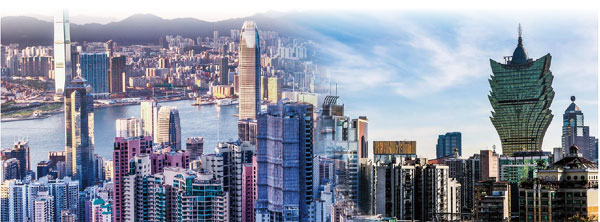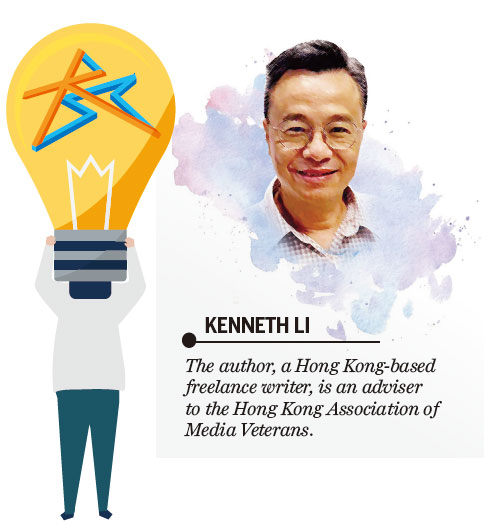GBA hits the cultural sweet spot


Kenneth Li says Hong Kong and Macao, with their unique historical backgrounds, are perfect cities for enriching Chinese civilization and blending their Western legacies with mainstream Chinese culture.
One of China's most pressing national strategic tasks in the post-COVID-19 era is to step up the development of the Guangdong-Hong Kong-Macao Greater Bay Area, where the future of Hong Kong and Macao lies in pursuing new development goals, especially in the generation of soft power that can challenge the narratives spun by hostile forces over Southeast Asia's shifting geopolitical landscape.
However, the biggest challenge to creating economic miracles in the GBA lies in the seamless integration of the two special administrative regions into the nation's strategic planning, given the unique historical backgrounds of both cities. Hong Kong and Macao are the gateway cities in the GBA, where a cluster of 11 cities makes the region one of the most promising places in the aftermath of the pandemic.
The nation's plan is to turn the city cluster into a world-class bay area ideal for living, working and traveling. It will ultimately provide plenty of job and business opportunities for university graduates, young professionals and entrepreneurs in the region.
Indeed, Hong Kong lags behind Macao in terms of integration into the GBA. The lingering counterconstructive influence of British colonialism on the new generation is a major obstacle to the integration process, as reflected in the 2019 social unrest. The deterioration in Sino-US relations and the British government's uncompromising stance on abandoning its nostalgic colonial glory have made Hong Kong - China's window to the West - an inevitable victim of international politics, hindering its smooth integration into the great Chinese family.
After years of anti-China indoctrination by the US-led West, a large number of Hong Kong people, especially the younger generation, have turned a cold shoulder to the GBA's national strategic plan. However, there are two sides to every coin and every cloud has a silver lining. The two SARs' exposure to Western culture, law and lifestyle is also an asset that can certainly enrich the essence of Chinese civilization in the long run.
Looking back at Chinese history, the great Han (206 BC to 220 AD) and Tang (618 to 907) dynasties were both golden ages of the past. Historical scholars have attributed the successes to our ancestors' ability to absorb and assimilate the diverse cultural contributions of different peoples, so that the blended and mixed new culture could demonstrate its vitality and innovation in all aspects of society. History has also proven that Chinese people have always been peace-loving instead of warmongering. Whenever Chinese civilization prevails, it benefits the whole of humanity.

The amazing achievements of the Communist Party of China in improving people's livelihoods, and in making great strides in science and technology, environmental protection and other important fields since the nation's reform and opening-up in 1978, have again demonstrated the vitality, creativity and richness of our 5,000-year-old civilization. By and large, this has paved the way for the fusion of various cultural legacies into a more dynamic and innovative new culture.
The GBA is, actually, a good playground for cultural convergence where Zhongyuan culture (Central Plains culture), Lingnan culture (Cantonese culture) and some Western characteristics of Hong Kong and Macao meet and interact with each other. Lingnan culture, which originated from the central part of China to the north, has developed distinctive traits and traditions of its own by constantly borrowing and adopting cultural elements from other Asian countries and even the West. Despite the ups and downs of history, Chinese civilization has shown remarkable continuity.
In this respect, residents in the GBA have demonstrated cultural inclusiveness because of their rich cultural heritage and the region's geographical location, where East meets West, enabling the two SARs to interact with the emerging coastal cities in Guangdong province.
On the other hand, "one country, two systems" has granted both SARs highly flexible and inclusive administrative privileges to facilitate their reunification with the motherland. Thus, by leveraging the advantages of "one country, two systems", the GBA will be a good catalyst for blending Western cultural legacies in the SARs with the mainstream Chinese culture over time.
The expansion of high-speed rail services has made frequent exchanges among people in various cities in the GBA possible. Related groups and organizations should organize more arts and cultural activities to strengthen Lingnan cultural ties and identity among cities in the region, promoting greater interaction and understanding. Such exchanges can expand collaboration in other areas. Organizers of cultural activities can also work with Hong Kong's education authorities and schools to reserve a certain number of places for Hong Kong students to help them feel the rapidly changing GBA at first hand.
However, we should, first and foremost, closely monitor the implementation of "one country, two systems" to ensure that fundamental beliefs, such as patriotism, national security and unity, and pride in traditional Chinese heritage and culture can be reestablished among the new generation of Hong Kong people. Without these core values rooted in the hearts and minds of the new generation, it would be difficult for Hong Kong to be seamlessly integrated into the GBA.
At the same time, it's also Hong Kong's sacred responsibility to take on the key task of promoting Chinese culture, as the city has been assigned a national mission in the 14th Five-Year Plan (2021-25) to make itself a global hub for arts and cultural exchanges between China and the world. As the most internationalized city with a long history of mixed cultures in China, Hong Kong is indeed the ideal place to take up the challenge.
President Xi Jinping has said that "cultural confidence represents a fundamental and profound force that sustains the development of a country and a nation". History has shown that Chinese civilization has great cultural assimilation power. As modern China's influence in the world arena grows, and Hong Kong assumes greater responsibility in driving the nation's soft power, especially in the cultural field, we are confident that the stories of the country and the Hong Kong Special Administrative Region can be presented and promoted in an attractive and convincing way to win the world's hearts and minds. The misinterpretations and the disinformation campaign launched by the US-led Western world will eventually be driven into oblivion.
The author, a Hong Kong-based freelance writer, is an adviser to the Hong Kong Association of Media Veterans.
The views do not necessarily reflect those of China Daily.
- National Games vibe is everywhere in Guangzhou
- Forum unites global experts to enhance city image communication
- Miao New Year celebrations get underway in Guizhou's Leishan county
- Mainland spokesman reiterates stand on Taiwan
- Fujian county's rural development becomes a big draw for Taiwan investors
- Nobel laureate in chemistry: Give young scientists more independence




































